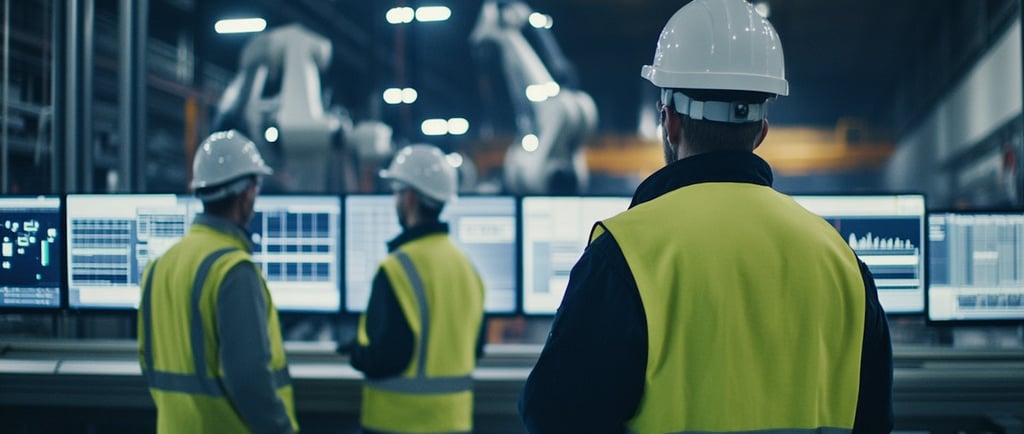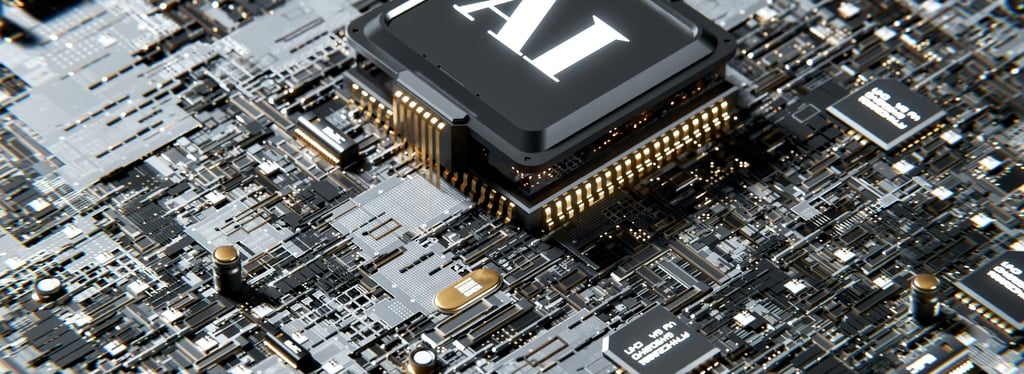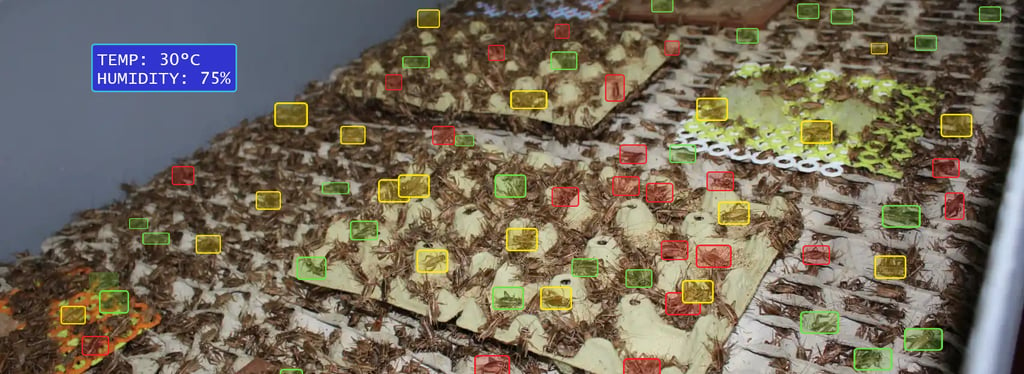Artificial Intelligence in the Industry: Types, Advantages and Applications
Revealing the Secrets of Artificial Intelligence and its Industrial Impact.
Martí Segura
6/4/20256 min read


La intel·ligència artificial a la indústria ha deixat de ser una visió futurista per a convertir-se en un pilar fonamental de la modernització productiva. La seva capacitat per a optimitzar operacions, predir fallades i transformar cadenes de subministrament la converteix en una eina indispensable en l'era actual. A Enginhum, aprofundim en els fonaments de la IA, les seves tipologies i, crucialment, les seves aplicacions de la intel·ligència artificial en la indústria en sectors clau com el packaging, la fabricació de maquinària, l'automoció i la indústria tèxtil.
What is Artificial Intelligence?
Weak Artificial Intelligence(ANI)
It is the most widespread form today. They are systems designed for specific tasks, such as recommendation systems or quality control systems in production lines. Their "intelligence" is specific and not generalizable.
Strong Artificial Intelligence (AGI)
A machine with human intellectual capacity, capable of learning and applying intelligence in any domain. It remains a research objective.
Superintelligent AI
A future theoretical version where AI exceeds human intelligence in all cognitive aspects. This concept, explored by Nick Bostrom in Superintelligence (2014), raises significant ethical and technical dilemmas.
Artificial Intelligence (AI) is a multidisciplinary field of computer science dedicated to the development of systems that emulate or overcome human cognitive abilities such as learning, problem solving, pattern recognition and decision making. Unlike traditional programming, AI is based on the creation of algorithms that learn from data and adapt autonomously. This capacity for self-learning is essential for AI in Industry 4.0.
AI taxonomy is classified into three main categories according to its scope:
Aquesta distinció és crucial per a entendre les aplicacions de la intel·ligència artificial a la indústria actual i futura.
Types of Artificial Intelligence
Reactive Machines
The most basic form of AI. They operate by perceiving the current environment and reacting to predefined stimuli without memory of past experiences. A historical example is IBM's Deep Blue, capable of beating a chess champion without "learning" from previous games.
Memory Limited
They can use historical data to inform future decisions, but only for a finite time. Most AI systems in today's industrial sector fall here. A self-driving vehicle, for example, uses real-time sensor data for driving, but does not store each route experience indefinitely.
Mind Theory
AI systems that, in research, understand and can infer human emotions, beliefs and intentions, vital for a more empathetic human-machine interaction in complex environments.
Self-awareness
Machine Learning - ML
It allows systems to learn from data without explicit programming. It includes Supervised Learning (for classification and regression, e.g. detection of defects in packaging products), Unsupervised Learning (for discovering hidden patterns) and Reinforced Learning (fundamental in robotics and process optimization).
Aprenentatge Profund (Deep Learning - DL)
Subcamp del ML que utilitza xarxes neuronals artificials profundes. Ha impulsat avanços en:
Visió per Computadora: Permet a les màquines "veure" i interpretar imatges, crucial en el control de qualitat automatitzat en l'automoció o la indústria tèxtil.
Processament del Llenguatge Natural (PLN): Permet a les màquines comprendre i generar llenguatge humà, aplicable en bots industrials o anàlisis de documentació tècnica.
Functional Classification for AI in the industrial sector
Beyond range classification, AI is categorized by its functionality and complexity. This classification, proposed by Arend Hintze (2016), offers a granular view applicable to industrial automation with AI:
In addition to these types of artificial intelligence, AI is materialized through methodological subfields:


Process Optimization and Operational Efficiency:
Manteniment Predictiu: Algorismes de ML analitzen dades de sensors (vibració, temperatura) de la maquinària industrial per a predir fallades, reduint el temps d'inactivitat no planificat. Empreses com Siemens i GE han aconseguit fins a un 30% de millora en eficiència operativa.
Optimització de Cadena de Subministrament: En el packaging i l'automoció, la IA optimitza inventaris i rutes logístiques, minimitzant costos i temps.
Control de Qualitat Automatitzat: Sistemes de visió per computadora basats en Deep Learning identifiquen defectes en línia de producció amb una precisió i velocitat inassolibles per a l'ull humà.
Advantages of Artificial Intelligence in Industry
Increase in Productivity and Cost Reduction
Industrial automation with AI (collaborative robotics) performs repetitive or dangerous tasks, freeing staff for roles of greater added value.
In Enginhum we design and integrate intelligent work cells, in collaboration with robotics providers, for tasks such as welding, assembly or palletizing. Our solutions include artificial vision for adaptability and intelligent control systems that allow reconfigure tasks without complex reprogramming.
Innovation and Product Development
La IA accelera el disseny i la simulació, permetent als enginyers iterar i provar noves idees més ràpid, per exemple, en el disseny optimitzat d'envasos per a la indústria del packaging.
Oferim solucions de disseny assistit per IA, ideals per al sector de l'embalatge o automoció, on combinem optimització topològica, anàlisi FEM i simulació de processos per a validar conceptes ràpidament. Això permet reduir costos de desenvolupament i llançar productes més eficients i sostenibles.
Cost of Implementation and Maintenance
Initial investment in machinery, software, data infrastructure and specialized talent can be high, especially for SMEs.
At Enginhum we design modular and scalable AI solutions, adapted to the level of technological maturity of each company. We optimize investment by using hybrid infrastructure (on-premise + cloud) and open-source technologies when viable. In addition, we advise on low-cost pilot projects that allow you to validate the return before climbing.
Disadvantages and Challenges of AI in Industry:
Need for High Quality Data
AI algorithms require large volumes of clean and relevant data to generate real value.
Our services include the evaluation and preparation of the data ecosystem: we carry out data quality audits, definition of "pipelines" of extraction and cleaning, and intelligent labelling systems. We also work with AI techniques that require less supervised data (such as semi-supervised learning or self-learning).
Skills gap
L'escassetat de professionals amb coneixements en IA dificulta l'adopció per part de les empreses industrials.
A través de les nostres consultories i formacions personalitzades, Enginhum capacita als equips interns per a gestionar i mantenir solucions de IA. A més, podem actuar com partner tecnològic extern per a cobrir la bretxa mentre es desenvolupa el talent intern.
Ethical and Security considerations
Issues such as algorithmic bias, data privacy, cybersecurity and transparency of AI decisions are crucial.
We integrate ethical and explainable AI principles from the design phase. We audit models in search of biases and design architectures that guarantee traceability and control of automated decisions. We also apply good industrial safety practices in all our developments, including encryption, access control and protection against attacks.
Impact on Employment
AI accelerates design and simulation, allowing engineers to iterate and test new ideas faster, for example, in optimized packaging design for the packaging industry.
We accompany our clients in sustainable technological reorganization processes, identifying opportunities to reconvert industrial profiles through continuous training plans. We promote the concept of "human-machine collaboration" so that technology increases, not replaces, human knowledge.
Artificial Intelligence in Manufacturing:
Predictive maintenance
With IoT sensors and machine learning models, companies can predict when a machine will fail before it happens. This reduces downtime and saves repair costs.
Real example: Heavy machinery manufacturers are integrating AI algorithms to estimate the useful life of their components. Companies like Grillco have demonstrated 30% improvements in operational efficiency thanks to this technology.
Automated Quality Control
Thanks to computer vision, cameras in production lines detect imperfections more accurately than a human operator.
Example: In the packaging sector, systems trained with neural networks can detect defects in labels or containers at speeds impossible for a human eye, guaranteeing the quality of the product.
Optimization of the Supply Chain
Predictive algorithms can anticipate demand, optimize logistics routes and reduce inventories.
Use case: A textile company can adjust production based on historical demand patterns analyzed by AI, minimizing excess stock and optimizing resources.
Collaborative robotics (Cobots)
Smart robots working alongside humans are no longer a thing of the future. They help in repetitive or physically demanding tasks, improving safety and productivity in industrial automation with AI.
Example: In small and medium-sized automotive companies that manufacture specific components, cobots are used for precision coupling tasks or for handling heavy parts, releasing operators to perform quality controls or more complex tasks, and allowing more flexible production adapted to demand.
Conclusion: Artificial Intelligence in Industry as an Axis of Transformation
Artificial intelligence in industry is a transformative force that redefines efficiency and innovation. From its types of artificial intelligence to its complex applications of artificial intelligence in industry, it offers an arsenal of tools to optimize processes. The advantages of artificial intelligence in industry are undeniable, from predictive maintenance to industrial automation with AI. SMEs in sectors such as packaging, machinery manufacturing, automotive and the textile industry are already harvesting the fruits of artificial intelligence in manufacturing.
Interested in optimizing your industrial processes with artificial intelligence? Contact us. At Enginhum, we are your strategic partner to integrate AI solutions in the industrial sector that adapt to the specific needs of your company.
References and additional readings:
Bostrom, N. (2014). Superintelligence: Paths, Dangers, Strategies. Oxford University Press.
Russell, S. J., & Norvig, P. (2010). Artificial Intelligence: A Modern Approach (3rd ed.). Prentice Hall.
Hintze, A. (2016). Understanding the four types of AI, from reactive robots to self-aware systems. The Conversation.
Goodfellow, I., Bengio, Y., & Courville, A. (2016). Deep Learning. MIT Press.
UNESCO. (2021). Recommendation on the Ethics of Artificial Intelligence.
European Commission. (2021). Proposal for a Regulation laying down harmonised rules on artificial intelligence (Artificial Intelligence Act).
Practical examples in industrial SMEs
Artificial intelligence in manufacturing is not exclusive to large corporations; SMEs are integrating Artificial Intelligence to improve their competitiveness:


Places
Castellar del Vallès, Barcelona, Cataluña
La Guardia, Pontevedra, Galicia
Connect with Enginhum
Contact with Enginhum
Marc Garnacho - +34 606.683.378
Martí Segura - +34 661.727.166
Information
Opening time
Monday to Thursday: 8:00 - 18:30
Friday: 8:00 - 15:00
